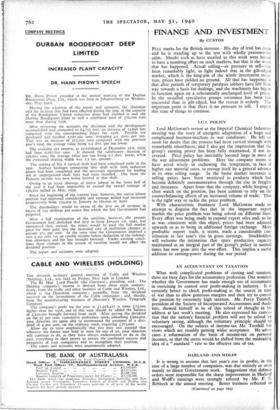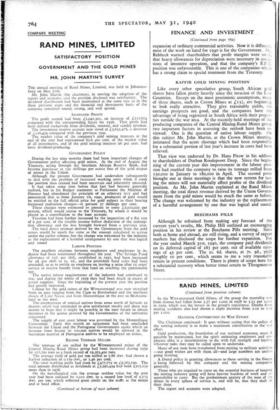FINANCE AND INVESTMENT
By CUSTOS
FULL marks for the British investor. His day of trial has cotae and he is standing up to the test with wholly praiseworthy calm. Shocks such as have assailed us this week were bound to have a numbing effect on stock markets, but that is the worst that has happened. Actual selling—or pressure to sell—has been remarkably light, so light indeed that in the gilt-edged market, which is the king-pin of the whole investment struc- ture, prices have yielded no ground. All that has happened is that after periods of temporary paralysis jobbers have felt their way towards a basis for dealings, and the machinery has begun to function again on a substantially unchanged level of prices. In the so-called speculative groups resistance has been less successful than in gilt-edged, but the retreat is orderly. The important point is that there is no pressure to sell. I expect this state of things to continue.
I.C.I. POLICY
Lord McGowan's review at the Imperial Chemical Industries meeting was the story of energetic adaptation of a huge and complicated business-machine to war conditions. He left no room for doubt that the process had been carried through with remarkable smoothness, and I also get the impression that the group's earning power has been fully maintained, if not in- creased. Price policy has inevitably loomed large in most of the war adjustment problems. Here the company seems to have acted wisely in eschewing the temptation, in face of higher raw material costs, to recoup itself by a general advance in its own selling range. In the home market increases in selling prices have been restricted to products which had become definitely unremunerative through the rise in freights and insurance. Apart from that the company, while keeping a close watch on the position, has been content to rely on the counterbalancing effects of an increased volume of trade. That is the right way to tackle the price problem. With characteristic frankness Lord McGowan made no attempt to disguise the fact that in the important export market the price problem was being solved on different lines. Every effort was being made to expand export sales and, so far as was consistent with this object, prices had been adjusted upwards so as to bring in additional foreign exchange. More profitable export trade, it seems, made a considerable con- tribution to last year's rise in gross earnings. Stockholders will welcome the intimation that spare productive capacity maintained as an integral part of the group's policy in normal times has now gone into the war-effort. This implies a useful addition to earning-power during the war period.
AN ACCOUNTANT ON TAXATION
What with complicated problems of costing and taxation, these are busy days for the accountancy profession. One wonders whether the Government has made enough use of accountants in exercising its control over profit-making in industry. It is certainly better to check profit-making at the source in time of war than to allow generous margins and then try to correct the position by extremely high taxation. Mr. Percy Toothill, president of the Society of Incorporated Accountants and Audi- tors, showed himself to be of this school of thought in his address at last week's meeting. He also expressed his convic- tion that the nation's financial problem will not be solved by voluntary saving, although the voluntary principle should be encouraged. On the subject of income-tax Mr. Toothill has views which are steadily gaining wider acceptance. He advo- cates a reformation of the basis of income-tax on personal incomes, so that the stress would be shifted from the misleading idea of a " standard " rate to the effective rate of tax.
HARLAND AND WOLFF
It is wrong to assume that last year's rise in profits, in the case of a large number of companies, was due entirely or even mainly to direct Government work. Suggestions that defence orders were responsible for the sharp improvement in Harland and Wolff's earnings were strongly refuted by Mr. F. E. Rebbeck at the annual meeting. Better business reflected an
(Continued on page 764)
FINANCE AND IN VESTMENT
(Continued from page 762) expansion of ordinary commercial activities. Now it is differ.:- most of the work on hand for 194o is for the Government. Rebbeck warned shareholders that profit margins were sn that heavy allowances for depreciation were necessary in cot. tions of intensive operation, and that the company's El' 1. position was unfavourable. This is one of the companies wh has a strong claim to special treatment from the Treasury.
KAFFIR GOLD MINING POSITION Like every other speculative group, South African g shares have fallen pretty heavily since the invasion of the I. Countries. Except on the most pessimistic assumptions, ma i% of these shares, such as Crown Mines at L131, are beginnii:g to look really attractive. They give reasonable yields, the earnings prospects are good, and the companies have the advantage of being registered in South Africa with their proper- ties outside the war area. At the recently-held meetings of the producing companies of the Central Mining-Rand Mines group two important factors in assessing the outlook have been re- viewed. One is the question of native labour supply. On this subject Mr. John Martin, at the Crown Mines meeting. intimated that the acute shortage which had been responsibl for a substantial portion of last year's increase in costs had been relieved.
That view was endorsed by Dr. Hans Pirow in his addross to shareholders of Durban Roodepoort Deep. Since the begin- ning of the current year this improvement in the labour posi- tion had enabled the company to raise its tonnage milled from 150,000 in January to 18o,000 in April. The second point brought out at these meetings is that the new system for tax- ing the mines will not materially affect profits or the dividend position. As Mr. John Martin explained at the Rand Mines meeting, the total direct revenue derived by the Union Govern- ment from the gold mines would be much the same as before. The change was welcomed by the industry as the replacement of a harmful arrangement by one that was logical and sound.
BEECHAMS PILLS
Although he refrained from making any forecast of the current year's results, Mr. Philip Hill outlined an encouraging position in his review at the Beechams Pills meeting. Sales both at home and abroad, are still rising, and a survey of export markets has disclosed the scope for further expansion. For the year ended March 31st, 1940, the company paid dividends on its deferred capital of 281- per cent. out of available earn- ings of 45 per cent. The 2S. 6d. shares, at 7s. 3d., yield roughly Jo per cent., which seems to me a very reasonable return in present conditions. There is plenty of scope here for a substantial recovery when better times return to Throgmorton Street.































 Previous page
Previous page